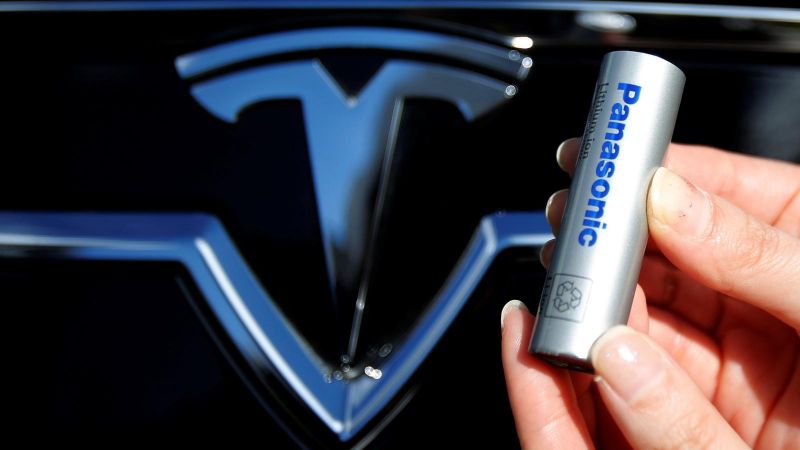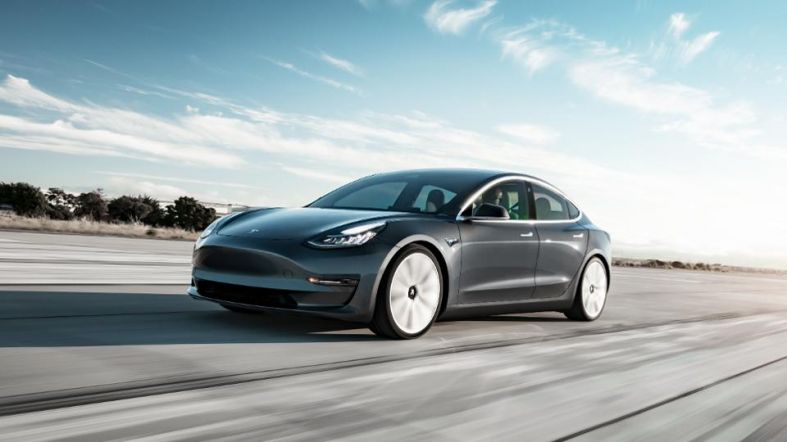Tesla is Working on a New ‘Million Mile' Battery That Will Lower the Cost of its Electric Vehicles
【Summary】Electric automaker Tesla plans reveal its new advanced battery later this year which will debut in the China-made Model 3. The new low-cost battery is designed to last for one million miles and will allow Tesla to profitably sell its electric vehicles for around the same price of a gas-powered one.

One of the hurdles for the mass adoption of electric cars is their higher cost compared to gas-powered vehicles. For automakers building electric vehicles, that cost is in the batteries, which contain cobalt and other rare earth materials and are expensive to produce.
The high cost of electric vehicle batteries is one of the reasons why the Long Range Tesla Model 3 costs nearly $49,000, while the gas-powered Toyota Camry L, the best selling sedan in the U.S. in 2019, has a starting MSRP of $24,425.
For electric automaker Tesla, which is on a mission to transition the world to sustainable energy, bringing down the cost of its batteries is a top priority and the company will introduce its latest battery later this year, Reuters has learned.
Tesla plans to introduce a new low-cost, long-life battery in its China-made Model 3 later this year or early next that it expects will bring the cost of electric vehicles in line with gasoline models.
The new battery could be "game-changing" for Tesla.
Tesla Chief Executive Elon Musk has been hinting at these new batteries for the past several months and said that Tesla will reveal significant advances in battery technology during a "Battery Day" event later this month.
The new low-cost batteries are designed to last for "one million miles" and will allow Tesla to profitably sell its electric cars for around the same price of a gas-powered vehicle, people familiar with the plans told Reuters.
Tesla's new batteries will rely on innovations such as low-cobalt and cobalt-free battery chemistries, and the use of chemical additives, materials and coatings that will reduce internal stress and enable batteries to store more energy for longer periods, sources said.
Cobalt is found in only a few places on earth. As demand soars the price of cobalt is increasing, so many global automakers are looking for ways to reduce the amount used in their future electric vehicle batteries, or eliminate it entirely.

Tesla new battery will debut in the China-built Model 3 and will eventually be available in U.S.-made vehicles.
Tesla's new million mile battery was jointly developed with Chinese battery maker Contemporary Amperex Technology Ltd (CATL) and includes technology developed by Tesla in collaboration with a team of academic battery experts recruited by Musk, three people familiar with the effort said.
The lithium-iron phosphate (LFP) batteries developed by CATL contain no cobalt. It would be the first time Tesla built a vehicle using LFP batteries instead of the typical lithium-ion type.
Reutuers reported in February that Tesla has been in talks with CATL for over a year to supply LFP batteries that will be less costly to produce than its existing batteries by a "double-digit percent," the sources said.
The cost of CATL's cobalt-free lithium iron phosphate battery packs has fallen below $80 per kilowatt-hour, with the cost of the battery cells dropping below $60/kWh, the sources said. CATL's low-cobalt NMC battery packs are close to $100/kWh.
Auto industry executives have said $100/kWh for battery packs is the level at which electric vehicles reach rough parity with internal combustion competitors.
Currently EV batteries cost around $156 per kWh, down from over $1,100 a decade ago due to new battery chemistries and improved manufacturing techniques.
"We've got to really make sure we get a very steep ramp in battery production and continue to improve the cost per kilowatt-hour of the batteries — this is very fundamental and extremely difficult," Elon Musk told investors in January. "We've got to scale battery production to crazy levels that people cannot even fathom today."
The new batteries will eventually be introduced in Tesla vehicles sold in the U.S., according to Reuters. The higher energy density batteries are expected to greatly improve the range of Tesla's vehicles.
Tesla is also working on recycling and recovery of battery metals including nickel, cobalt and lithium with Redwood Materials, a recycling company founded by Tesla co-founder and former CTO JB Straubel in 2017.
Tesla is also exploring new "second life" applications of electric vehicle batteries in grid storage systems, such as the one Tesla built in South Australia in 2017, which is the world's largest lithium-ion battery. The battery in South Australia is paired with a wind farm and was built to store renewable energy in partnership with French renewable energy company Neoen.
With a global fleet of more than 1 million electric vehicles that are capable of connecting to and sharing power with the grid, Tesla's goal is to achieve the status of a power company, according to Reuters.
Cell-to-Pack Battery Technology
CATL also has developed a simpler and less expensive way of packaging battery cells, called cell-to-pack technology, which eliminates the production step of bundling thousands of individual cells into multiple battery modules. Tesla is expected to use the technology to help reduce battery weight and production costs.
Tesla's vehicle battery packs currently contain thousands of individual battery cells made in a joint venture with Panasonic. These battery cells are then installed into modules that make up the battery pack. The Model 3 battery pack for example, is made up of four individual battery modules which are wired together.
However, the separate modules containing the thousands of cells adds weight and complexity to the production process, so eliminating them will enable Tesla to produce batteries which are lighter, more energy dense and cost less to manufacture, resulting in a lower cost electric cars that offer a longer range.
Tesla also plans to implement new high-speed, heavily automated battery manufacturing processes designed to reduce labor costs and increase production in massive "terafactories" about 30 times the size of the company's sprawling Nevada gigafactory.
The sources said CATL also plans to supply Tesla in China next year with an improved long-life nickel-manganese-cobalt (NMC) battery whose cathode is 50% nickel and only 20% cobalt.
Tesla now jointly produces nickel-cobalt-aluminum (NCA) batteries with Panasonic at a "gigafactory" in Nevada, and buys NMC batteries from LG Chem in China for its vehicles built in Shanghai.
Electric vehicle makers have switched to using the more common nickel-cobalt-aluminum (NCA) or nickel-manganese-cobalt (NMC) batteries for electric vehicles because of their higher energy density, which results in EVs with a longer range. NMC batteries are also commonly used in rechargeable power tools and e-bikes.
Tesla also announced today it began production of the Long Range Model 3 in Shanghai for the first time and will begin deliveries to customers soon.
resource from: Reuters
-


Ford is Testing a New Robotic Charging Station to Assist Drivers of EVs With Disabilities
-


Ford Raises the Prices of the F-150 Lightning Electric Pickup Due to Rising Raw Material Costs
-


The BMW 7-Series to Feature HD Live Maps From HERE Technologies for Hands-Free Highway Driving in North America at Speeds up to 80 MPH
-


AutoX to Use the 'Eyeonic Vision Sensor' from California-based SiLC Technologies for its Robotaxi Fleet in China
-


LG Develops ‘Invisible’ Speaker Sound Technology That Could Revolutionize In-Vehicle Audio
-


Researchers at South Korea’s Chung-Ang University Develop a ‘Meta-Reinforcement’ Machine Learning Algorithm for Traffic Lights to Improve Vehicle Throughput
-


Zeekr’s New 009 Electric Passenger Van is the World’s First EV to Feature CATL’s Advanced ‘Qilin’ Battery With a Range of 510 Miles
-


Redwood Materials is Building an Electric Vehicle Battery Recycling Facility in South Carolina
- Polestar Shares the First Image of the Polestar 3 Electric SUV Ahead of its October Debut
- Facing Rising Production Costs, Automakers Ford, GM, Stellantis and Toyota Urge Congress to Lift the Cap on the $7,500 EV Tax Credit
- The Tesla Model Y and Model 3 Take the 1st and 2nd Place Spots in the Annual Cars.com ‘American-Made Index’
- The BMW 7-Series to Feature HD Live Maps From HERE Technologies for Hands-Free Highway Driving in North America at Speeds up to 80 MPH
- Solar-Electric Car Developer Lightyear Announces Technical Partnership with Hypercar Manufacturer Koenigsegg
- GM's Rebate of up to $6,000 on the Bolt EV and EUV Has a Big Stipulation
- Acura Prevision EV Concept Previews Brand’s Electric Future
- US-listed LiDAR Developers Velodyne and Ouster to Merge in an All-Stock Deal
- Premium Chinese EV Brand Zeekr Seeks to Raise $1 Billion in U.S. IPO, According to Sources
- LG Chem is Investing $3.2 Billion to Build a Cathode Manufacturing Facility for Electric Vehicle Batteries in Tennessee











 About Us
About Us Contact Us
Contact Us Careers
Careers